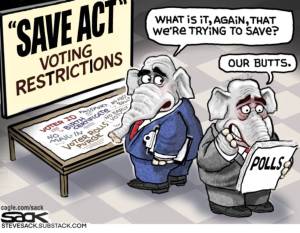The White House comedy club
Published 4:36 pm Saturday, October 26, 2013
WASHINGTON — While the nation’s attention has been riveted on the Keystone Congress, the executive branch was busy developing its own comedy routine. Picture the cast (you know the characters) shrugging their shoulders in unison: “Who, me?”
This would be the response to the glitch-rich health care rollout, for which no one seems responsible. “Beats me. I thought it was working!” This would also be the response to the eavesdropping scandal, which soon could become an international showdown. “Who knew?” Hint: He used to work at the NSA and now lives in Russia.
Not least, the shrug also would be the response to a White House rumor that a certain Republican House leader said to President Obama during a government shutdown meeting, “I cannot even stand to look at you.”
Except no one said it. Shrug.
The rumor kicked off uncharacteristically glitch-free when Sen. Dick Durbin, D-Ill., heard it from what he apparently considered a reliable source and posted it on his Facebook page. Early rumor embellishments suggested that House Speaker John Boehner was the demon source, which later was clarified to impugn Pete Sessions, R-Texas, who denied it.
In fact, no one said it, according to a White House official, who attributed the untruth to a “miscommunication” during a report by White House Deputy Chief of Staff Rob Nabors to Senate Majority Leader Harry Reid. Of course, Reid told the entire Senate Democratic caucus, identifying Sessions as the evil-doer. Durbin did not name Sessions in his post.
Voila! A rumor is born. Roll cameras. The White House regrets the “misunderstanding.” Cut.
Meanwhile, the “rollout,” a term forever tarnished by the ineptitude displayed since Oct. 1 when Americans were finally going to be able to sign up for “affordable” (translation: I buy, you pay) health insurance, has been an embarrassment. Even if one is inclined to grant benefit of the doubt (because technology can be a beast), evidence suggests that the “glitches” were the result of poor judgment and bad decisions.
But whose?
Four contractors hired to set up the computer system testified during congressional hearings that system testing began just two weeks before the launch date — and the test failed. Part of the problem was a decision not to allow customers to browse anonymously, as most people doubtless would prefer. Privacy and all that (chortle, chortle). Instead, people had to fill out forms before they could take a peek at the merchandise — an unmanageable burden to a system inadequate to the immense demand.
Who made that decision? The contractors testified they didn’t know who made the decisions or who was responsible for correcting problems. One can blame the computer guys, of course. Or demand the head of Health and Human Services Secretary Kathleen Sebelius, under whose supervision the Affordable Care Act falls. But ultimately, the responsibility for the popularly known “Obamacare” rests with the person who insisted in the midst of a historic recession, a global financial meltdown and record unemployment that we needed to overhaul the entire health care industry.
Not to drone on, but yet another “meanwhile” demands attention: A photo of German Chancellor Angela Merkel on the front page of Friday’s Wall Street Journal saves writers a thousand words. She may be giving the evil eye to a photographer as she arrives at a European Union summit in Brussels, but it perfectly captures sentiments she has expressed upon learning of a report that the National Security Agency had been listening to her cellphone conversations.
Not only Merkel but as many as 35 world leaders may have been targets of our eavesdropping, according to Britain’s Guardian newspaper. They are not amused.
Consequences, which include potential damage to a trans-Atlantic free trade agreement, are yet to be fully imagined. What we cannot avoid registering is that we look like not the glimmering city on the hill but a ship of untrustworthy fools.
We reportedly eavesdrop on our allies and force citizens to buy insurance through a system we can’t manage. We concoct character-smearing rumors and attach them to our political adversaries. And that’s just the executive branch. Most important, we have damaged our bonds of trust with nations we need to keep as friends.
Any one of the above would make for a very bad week in governance. Combined they suggest an uncomfortable conclusion to the world we purport to lead: The lights are flickering in the city on the hill and our ship of state is foundering.
Kathleen Parker is a Washington Post columnist. Her email address is kathleenparker@washpost.com.


